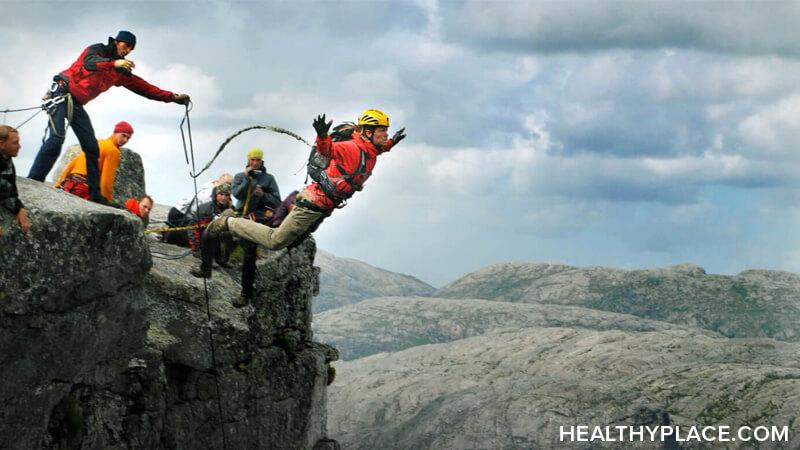Can Tense Situations Benefit Our Experience of Bliss?

I like to avoid tense situations in my everyday life. I enjoy living in a peaceful, harmonious, and stable society. Yet tense situations are an inescapable part of nature. Life-or-death struggles are ever-present, whether fighting over territory, for a mate, searching for food, or avoiding being eaten. In an increasingly civilized world, can intentionally engaging in tense and stressful situations benefit our experience of bliss?
Avoiding Tense Situations and Bliss
In 2018, just over 1.3 billion people, or about 17 percent of the World's population, lived in developed countries.1 Understanding how fortunate I am to be one of those people plays a big part in creating my blissful life. I appreciate all the conveniences surrounding me, such as clean running water, easy access to fresh food, and excellent healthcare. Social structures and systems regulate many of my interactions. Unlike a wild animal, I can negotiate relationships without violent confrontations, and there's no need to face rivals to secure territory or food. I'm not living moment-to-moment in a fight to survive.
This abundance and convenience have created a situation that allows me to focus on other aspects of life and spend time doing what I enjoy. I have the luxury of seeking experiences that bring me happiness and fulfillment. I can pursue exciting physical and intellectually stimulating activities. I can cultivate meaningful relationships, and as a teacher, I can contribute to helping others reach their goals and ambitions. A lack of tense situations enhances my bliss.
Does Engaging in Tense Situations Enhance Bliss?
I'm grateful daily for the freedom and choices living in a developed country affords me. However, I sometimes think about what we might have lost as we stray further from our innately wild nature. I'm curious whether there are crucial elements of life we miss out on by continually avoiding stressful and sometimes dangerous situations. I wonder if always living in a harmonious and stable environment is why some people intentionally seek out challenging, high-pressure jobs. Could it also explain the popularity of combat sports such as boxing and wrestling and extreme adventure sports like skydiving and surfing?
Like most of my friends at school, I was into skateboarding. Rock climbing has been part of my life for over 20 years, and I also love snowboarding in winter. Participating in such intense sports can be risky, and I've ended up in hospital with broken bones, sprains, and other injuries on more than one occasion. Some people can't understand the attraction of these hazardous activities. Still, for me, they offer undeniable benefits.
Tense Situations and My Bliss
Taking part in these exhilarating pursuits pushes me outside of my comfort zone. It requires mental and physical fortitude and forces me to cultivate resilience and a deeper understanding of my capabilities. The feeling of accomplishment after snowboarding down a steep mountain or climbing a formidable rock face outweighs whatever stress is involved. In studies, subjects exposed to intermittent stressors have displayed similar challenge-or-stress-induced arousal. Such arousal defines physiological toughness and corresponds with positive performance, emotional stability, and immune system enhancement.2
Experiencing tense situations in this way shakes up my daily routine and contributes to bliss. It offers a heightened sense of fulfillment and gives me a greater appreciation of the peaceful moments in life. The harder I work and play, the harder I can relax. While some may also find similar value in deliberately exposing themselves to stress and danger, others may find it more desirable to maintain a calm and stress-free existence. Ultimately, whether intentionally seeking out tense situations benefits our experience of bliss is subjective and depends on our individual preferences and viewpoints.
Sources
- Wang, B. (2018, November 19). Developed Country population from 17% to over 50% of World by 2050. NextBigFuture.com. https://www.nextbigfuture.com/2018/11/developed-country-population-from-17-to-over-50-of-world-by-2050.html
- Dienstbier, R. A. (1989, January). Arousal and physiological toughness: Implications for mental and physical health. Psychological Review, 96(1), 84–100. https://doi.org/10.1037/0033-295x.96.1.84
APA Reference
Brocklebank, M.
(2023, August 7). Can Tense Situations Benefit Our Experience of Bliss?, HealthyPlace. Retrieved
on 2026, February 1 from https://www.healthyplace.com/blogs/livingablissfullife/2023/8/can-tense-situations-benefit-our-experience-of-bliss
